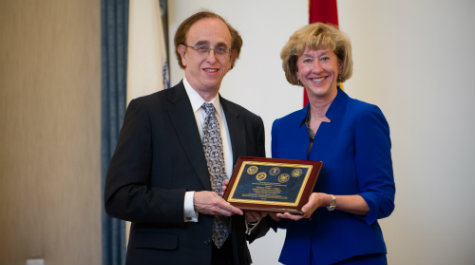Judge Advocates Foundation Recognizes Professor Lederer with Highest Honor
The Judge Advocates Foundation honored William & Mary Chancellor Professor of Law Fredric I. Lederer on May 26 with the Chief Justice John Marshall Lifetime Achievement Award, the Foundation's highest honor. Lederer received the award at a dinner in Arlington, Va., sponsored by the Foundation and the Judge Advocates Association. The Judge Advocates General of all of the armed forces and numerous other present and retired senior officers attended the event.
The text of the award stated that it was given to Lederer "who in the tradition of the Great Chief Justice, honorably served as a Judge Advocate, and continues in making inspiring, immeasurable contributions to our Nation outside the military legal system."
Previous recipients of the award include Sens. Lindsey Graham (R-SC) and Roger Wicker (R-Miss.); several federal court judges, including Judge H. Robert Mayer, J.D. '71, of the U.S. Court of Appeals for the Federal Circuit; and retired Army Major General William K. Suter, former Assistant Judge Advocate General and Clerk of the Supreme Court of the United States.
Retired Army Brig. Gen. Malinda E. Dunn presented the award and told the audience that Lederer was selected for the honor in recognition of "his contributions to legal scholarship and the legal profession through his groundbreaking initiatives in courtroom technology." Lederer is founder and director of The Center for Legal and Court Technology (formerly the Courtroom 21 Project), a joint initiative of William & Mary Law School and the National Center for State Courts.
"We are fortunate that Fred's love of the law and interest in technology have combined to drive the development and implementation of legal technology worldwide," Dunn said. In addition to transforming the law school's McGlothlin Courtroom into "a laboratory courtroom of the future," she said he "anticipated and helped create many of the innovations in legal technology."
Dunn shared Lederer's wide-ranging endeavors with the audience. In addition to being a "go-to speaker," he has participated in more than 300 international forums. He also has written dozens of articles on legal technology, military law, criminal procedure and evidence. He has trained "generations of law students and practitioners in the use of courtroom technology." Judges, business executives, and courtroom professionals from around the globe seek out his expertise. "Because of him, Williamsburg is a world legal technology mecca," she said.
She noted that Lederer's service began as a judge advocate. Following his graduation from Columbia Law School, he served 12 years on active duty in the Army Judge Advocate General's (JAG) Corps, serving as a faculty member of the Army JAG School during that time and afterwards. He remained in the reserves until retiring as a colonel in 1998. Dunn described his contributions to military law as "legion." As examples, she cited that he was primary co-author of Military Rules of Evidence 301-316 and later co-author (with Francis Galligan) of Court-Martial Procedure, a two-volume treatise about to enter its fifth edition. He has taught military law in some aspect throughout his career, Dunn said, and added that since joining the William & Mary faculty in 1980 he has "mentored and befriended" more than 100 Army officers who have obtained their law degrees at the school through the Funded Legal Education Program.
About William & Mary Law School
Thomas Jefferson founded William & Mary Law School in 1779 to train leaders for the new nation. Now in its third century, America's oldest law school continues its historic mission of educating citizen lawyers who are prepared both to lead and to serve.



